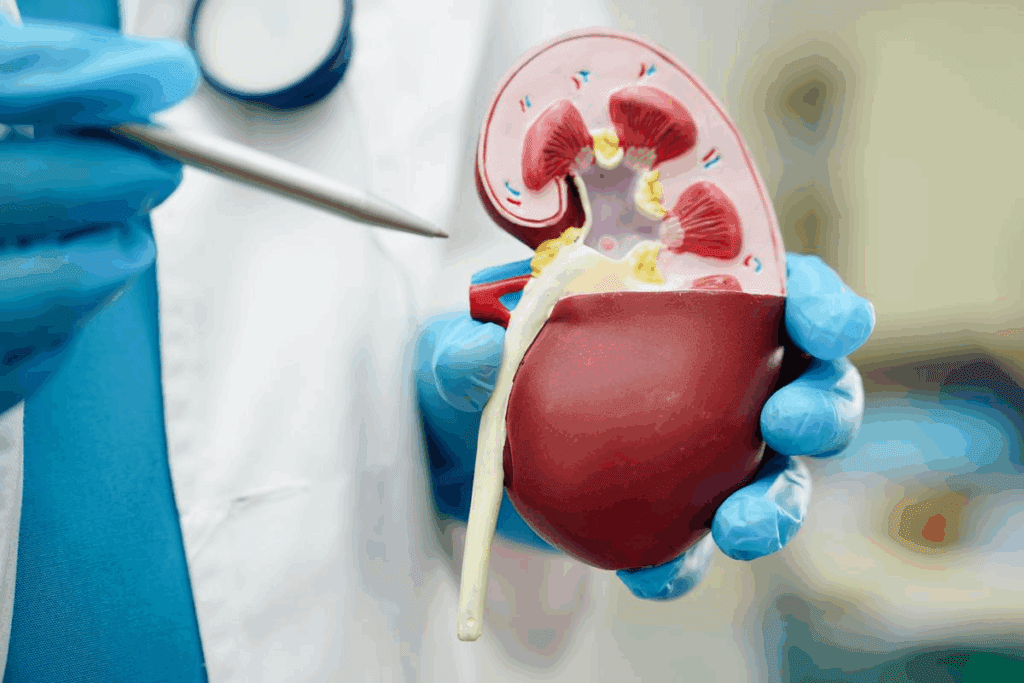
At Liv Hospital, we know how painful kidney stones can be. Many people look for natural ways to feel better, like using apple cider vinegar (ACV). Some think ACV can help with kidney stones, thanks to stories and early studies apple cider vinegar help with kidney stones.
Drinking lots of water can help move kidney stones along. ACV and lemon juice might also help prevent them. But, we need to look at the latest research to see if ACV really helps with kidney stones.

Kidney stones are small, hard mineral deposits that form in the kidneys. They happen when there’s an imbalance in the concentration of certain substances in the urine.
Kidney stones, also known as renal calculi, are solid pieces of material that form in the kidney. They occur when there’s an imbalance in the concentration of certain substances in the urine. They can be painful and may cause complications if not treated properly.
There are several types of kidney stones, each with different causes:
Several factors increase the risk of developing kidney stones:
| Risk Factor | Description |
| Dehydration | Low fluid intake concentrates the urine, increasing the risk of stone formation. |
| Diet | High intake of salt, animal protein, and oxalate-rich foods can increase the risk. |
| Family History | A family history of kidney stones increases an individual’s risk. |
| Medical Conditions | Conditions like hyperparathyroidism, gout, and urinary tract infections can contribute to stone formation. |
Kidney stones can cause severe pain, often described as one of the most painful experiences. Symptoms include:
If left untreated, kidney stones can lead to complications such as urinary tract obstruction, infection, and kidney damage.

Vinegar has been used in medicine for centuries. Apple cider vinegar is now a top natural remedy. Its long history in medicine has made it popular today.
Vinegar has been key in traditional medicine worldwide. The ancient Greeks used it for health reasons. Apple cider vinegar is known for aiding digestion and reducing inflammation.
Apple cider vinegar is now a hit as a health remedy. It’s believed to help with weight and heart health. Its popularity comes from its many uses and the desire for natural health options.
Many drink apple cider vinegar for its health perks. It’s thought to prevent kidney stones. While science is mixed, its long history and stories of success make it popular.
Apple cider vinegar is said to boost kidney health. It’s thought to detox and reduce pain from kidney stones. The acetic acid in it might prevent stones, but it’s not proven to dissolve them.
| Claim | Description | Evidence Level |
| Aids Detoxification | ACV may help in removing toxins from the body | Anecdotal |
| Reduces Inflammation | ACV may reduce inflammation associated with kidney stones | Limited Scientific Studies |
| Prevents Kidney Stones | Acetic acid in ACV may help prevent the formation of kidney stones | Some Scientific Evidence |
While apple cider vinegar’s benefits for kidney health are promising, talk to a doctor before using it. It’s important for treating kidney stones or any health issue.
Apple cider vinegar is more than a simple condiment. It’s a mix of compounds that might help your health. Knowing its nutritional profile is key to understanding its benefits.
Apple cider vinegar is mostly water and acetic acid. It also has malic acid, tartaric acid, and citric acid. The exact nutritional content depends on how it’s made and if it’s filtered or unfiltered.
Nutritional Components of Apple Cider Vinegar:
| Component | Typical Content |
| Water | 93-95% |
| Acetic Acid | 4-6% |
| Malic Acid | 0.1-0.4% |
| Tartaric Acid | Trace amounts |
| Citric Acid | Trace amounts |
Acetic acid is the main active compound in apple cider vinegar. It’s responsible for its taste and many health benefits. Studies show it might help prevent kidney stones by changing how the body handles calcium and citrate.
The role of acetic acid in preventing kidney stones is significant. It can help by adjusting calcium and citrate levels in the urine, reducing stone risk.
Apple cider vinegar can be filtered or unfiltered. The filtering process changes its nutritional content and health benefits.
Key differences between filtered and unfiltered ACV:
Many people wonder if apple cider vinegar (ACV) can help with kidney stones. It’s important to look at the latest scientific research and evidence.
Some studies suggest ACV might help prevent kidney stones. But, the evidence is not strong yet. Pilot studies and animal research show promise, but we need more human studies.
If you have kidney pain or problems, talk to a doctor before trying ACV. This is to make sure it won’t harm your health or interact with your medicines.
Several studies have looked into ACV’s role in preventing kidney stones. Some results are encouraging, but we need more research. Further research is necessary to fully understand ACV’s effects.
One big challenge is the limited number of human clinical trials. Most studies were done on animals or in labs. This makes it hard to know how it works in people.
Doctors are cautious about ACV and kidney stones. Some might suggest it as a supplement, but others want more proof. Healthcare providers say a healthy diet, enough water, and proven treatments are key for managing kidney stones.
In summary, ACV might help with kidney stones, but the science is not clear. If you’re thinking about using ACV, talk to your doctor first. They can help weigh the benefits and risks.
Apple cider vinegar (ACV) might help prevent kidney stones by affecting urine factors. It works in several ways to stop stones from forming.
ACV can increase urinary citrate levels. Citrate stops calcium stones from forming by binding to calcium. Studies show that more citrate in urine lowers kidney stone risk. ACV’s acetic acid boosts citrate production, protecting against stones.
Citrate is key because it:
ACV may also lower urinary calcium, reducing stone risk. Its acetic acid reduces calcium in urine, helping those with too much calcium.
Lowering calcium in urine is good because:
ACV’s acidity can balance urine pH, making it less likely for stones to form. A balanced pH can prevent uric acid stones.
ACV’s anti-inflammatory effects may also help prevent kidney stones. Chronic inflammation in the kidneys and urinary tract increases stone risk. ACV’s anti-inflammatory properties may reduce inflammation, making it harder for stones to form.
ACV’s anti-inflammatory effects can also ease kidney stone pain. Less inflammation means less pain and easier stone passage.
Some people think apple cider vinegar can dissolve kidney stones. But, the evidence isn’t as strong as they say. It’s important to look at the science behind this claim.
There’s not much proof that apple cider vinegar can dissolve kidney stones. Most studies focus on preventing new stones, not dissolving old ones. But, some research shows it might help prevent stones from forming.
Apple cider vinegar could work by changing how much citrate, calcium, and pH are in your urine. Let’s dive into these details.
| Mechanism | Potential Effect on Kidney Stones |
| Increasing urinary citrate | May help prevent stone formation by binding to calcium |
| Reducing urinary calcium excretion | Could decrease the concentration of calcium available for stone formation |
| Altering urinary pH | May make the urine less acidic, potentially reducing stone formation |
The size and type of kidney stones matter when using apple cider vinegar. Big stones might not change much. The type of stone also plays a role.
It’s key to know what apple cider vinegar can do for kidney stones. It might help prevent new ones but won’t dissolve old ones for sure. Doctors usually suggest it as part of a prevention plan, not as a cure.
In short, apple cider vinegar might help prevent kidney stones but isn’t proven to dissolve them. Always talk to your doctor before trying it for this purpose.
Using apple cider vinegar (ACV) for kidney health needs careful thought. It’s important to know how to use it right. Always talk to a doctor before starting ACV, if you have kidney problems or pain.
To use ACV for kidney stones, mix 2 tablespoons with 6 to 8 ounces of water. This makes it less acidic and easier on your stomach. Start with a small dose and increase it slowly, with a doctor’s advice.
Choose an unfiltered, organic ACV with the “mother” at the bottom. This type has more good stuff in it.
When to drink ACV can vary. Many drink it before meals to help with digestion and prevent kidney stones. You can drink it once or twice a day, based on how your body feels.
Pay attention to how your body reacts. If you feel sick to your stomach, drink less or talk to a doctor.
ACV can work better with other natural remedies for kidney health. Drinking lots of water, eating fruits and veggies, and eating less salt are good too. These help a lot.
“A healthy diet and enough water are key to avoiding kidney stones. Adding ACV to your routine might help even more.”
Medical Expert, Nephrologist
Starting an ACV regimen for kidney health? Be realistic. Some people see benefits like fewer kidney stones. Others might not notice much. Keep an eye on your health and adjust as needed, with a doctor’s help.
By following these tips and talking to doctors, you can use apple cider vinegar wisely for your kidney health.
Apple cider vinegar might help prevent kidney stones, but it’s not without risks. While it’s safe in small amounts, too much can cause health problems.
Apple cider vinegar isn’t good for everyone, mainly if you drink too much. Too much can upset your body’s mineral balance. This might weaken your bones or muscles.
ACV can affect how some medicines work, like diuretics and insulin. People taking these should talk to their doctor before trying ACV.
“The acidity in apple cider vinegar can potentially interact with medications, making it essential to monitor its use closely.” – Medical Expert, Nephrologist
Stay away from ACV if you have GERD or tooth enamel problems. It’s best to be careful or avoid it altogether.
If you notice these symptoms, stop using ACV and see a doctor:
Knowing these side effects helps you use apple cider vinegar safely. This way, you can try to prevent kidney stones without risks.
Preventing kidney stones needs a mix of methods, not just one. Apple cider vinegar might help, but other ways are important too.
Changing what you eat is key to avoiding kidney stones. Increasing citrate intake from foods like lemons and oranges can help. Try to eat less sodium and oxalate-rich foods to lower your risk.
Drinking enough water is vital for preventing stones. Water dilutes your urine, making it less likely for minerals to form stones.
At times, medical treatments are needed to stop kidney stones. We’ll explore these options with your doctor.
Apple cider vinegar isn’t the only natural remedy. Other options include:
Always talk to a healthcare professional before trying new remedies, if you’ve had kidney stones or other health issues.
The link between apple cider vinegar and kidney stones is not simple. Some studies hint that it might help prevent stones by changing how the body handles citrate and calcium. Yet, the evidence is not strong enough.
Kidney stones need a full treatment plan, which includes medical help and changes in lifestyle. Apple cider vinegar could be a helpful addition, but always talk to a doctor first. This is important for using it to prevent or treat stones.
It’s best to talk to a healthcare expert about your specific situation. They can help you find the right mix of medical advice and lifestyle changes. This way, you can lower your risk of getting kidney stones.
In summary, while apple cider vinegar might have some benefits, it’s not enough on its own to treat kidney stones. A good plan includes medical care, eating right, and staying hydrated. This balanced approach is key to keeping your kidneys healthy.
No, there’s no solid proof that apple cider vinegar causes kidney stones. In fact, some studies hint it might help stop stones from forming.
Some people claim apple cider vinegar can dissolve kidney stones. But, the science is not strong, and it might work differently for each stone.
Apple cider vinegar might prevent stones by boosting citrate levels in urine. It also helps by reducing calcium and balancing pH levels.
For kidney health, take 1-2 tablespoons of apple cider vinegar in water daily. Always talk to a doctor before starting.
Yes, apple cider vinegar can upset your stomach, harm teeth, and interact with medicines. Watch how your body reacts and stop if you notice bad effects.
Yes, you can mix apple cider vinegar with other natural methods like diet changes and staying hydrated. But, always check with a doctor first.
No, apple cider vinegar isn’t safe for everyone, like those with certain health issues or on specific meds. Always talk to a doctor before using it.
Seeing apple cider vinegar’s effects on preventing kidney stones varies. It depends on your stone disease severity and overall health.
Apple cider vinegar might ease kidney pain from stones because of its anti-inflammatory properties. But, see a doctor for the right diagnosis and treatment.
Some studies suggest apple cider vinegar might prevent stones. But, there’s little evidence it can shrink existing stones.
Subscribe to our e-newsletter to stay informed about the latest innovations in the world of health and exclusive offers!
WhatsApp us